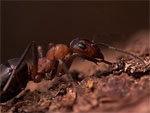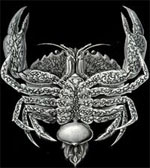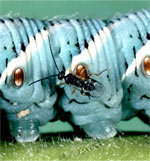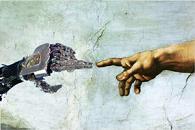Parasites, Symbiosis and the Mutation of Abstract Thought
Friday, October 13, 2006 → by DanieruKeep clear of the cat if you want baby girls. It sounds like the lamest of old wives' tales, but according to scientists women infected with a common cat parasite give birth to more sons than daughters.
The parasite, toxoplasma, infects around 15% of Britons, but up to 80% of the population in some countries. It is spread by contaminated cat faeces, but also lurks in uncooked pork and beef...
...They discovered that women whose antibody count was high - suggesting a substantial infection - had a much higher chance of having baby boys. In most populations the birth rate is around 51% boys, but women infected with toxoplasma had up to a 72% chance of a boy. Toxoplasma causes congenital defects in newborns and can trigger miscarriages, but a link with the gender of newborns has never been identified before.
Jaroslav Flegr and his team at Charles University in Prague believe the parasite may interfere with the immune systems of pregnant women and make it more likely for male embryos to survive. The research appears in the journal Naturwissenschaften. - Guardian Link
 This prime example of parasitic manipulation flies in the face of common sense, yet it is far from the weirdest example of its kind.
This prime example of parasitic manipulation flies in the face of common sense, yet it is far from the weirdest example of its kind.Parasitic protozoa Plasmodium directly affects the salivary glands of the mosquito, extending the time taken for the insect to feed. This simple manipulation allows Plasmodium to infect its next host, humans, and thus the Malaria cycle continues.
 As with many parasitic organisms Dirocelium denriticum, otherwise known as the lancet fluke, goes through various stages in its life cycle towards reproduction. At one such stage the fluke somehow highjacks the miniscule brains of its ant host, forcing it to crawl to the top of a blade of grass come nightfall. From here it is more likely the ant will accidentally be eaten by a cow, the next host for the fluke. If by morning the ant has not been eaten the fluke will loosen its voodoo-like grip leaving the ant to forage with its kin - that is until nightfall comes again.
As with many parasitic organisms Dirocelium denriticum, otherwise known as the lancet fluke, goes through various stages in its life cycle towards reproduction. At one such stage the fluke somehow highjacks the miniscule brains of its ant host, forcing it to crawl to the top of a blade of grass come nightfall. From here it is more likely the ant will accidentally be eaten by a cow, the next host for the fluke. If by morning the ant has not been eaten the fluke will loosen its voodoo-like grip leaving the ant to forage with its kin - that is until nightfall comes again.Sacculina barnacles can alter the lifecycle of their crab hosts, forcing even the males of the species to cease from normal activity and divert all their attention to the protection of the parasite within their bellies. The crabs will stop growing and reproducing, giving Sacculina the majority of its energy stores in a one way relationship to nowhere.
 As alien as these examples of parasitic bonds seem, it takes another step up the evolutionary ladder for us to consider them terrifying. Could a parasitic organism be so blatent in its struggle for existence as to alter the very genetic structure of its host? Viruses such as HIV bind their code into the DNA of the infected, forcing the next generation to carry the burden of a highjacked immune system. Another, more macroscopic, example of genetic manipulation can be found in the relationship between the Cotesia congregata wasp and its tobacco hornworm host. The wasp appears to carry a virus as part of its makeup which can fundamentally alter the interior structure of the hornworm's cells. Much as a person with full blown AIDS the parasitised hornworm's immune system has been genetically mutated to such a degree that its only value is in the production of more members of the parasitic species.
As alien as these examples of parasitic bonds seem, it takes another step up the evolutionary ladder for us to consider them terrifying. Could a parasitic organism be so blatent in its struggle for existence as to alter the very genetic structure of its host? Viruses such as HIV bind their code into the DNA of the infected, forcing the next generation to carry the burden of a highjacked immune system. Another, more macroscopic, example of genetic manipulation can be found in the relationship between the Cotesia congregata wasp and its tobacco hornworm host. The wasp appears to carry a virus as part of its makeup which can fundamentally alter the interior structure of the hornworm's cells. Much as a person with full blown AIDS the parasitised hornworm's immune system has been genetically mutated to such a degree that its only value is in the production of more members of the parasitic species.So now the leap of imagination you've come to expect from The Huge Entity:
 Somewhere along the evolutionary line of most species a parasitic 'relationship' has been prevelant. Some of these organisms, once intertwined along the evolutionary path, become as if a single, symbiotic organism. The bacteria living in our gut for instance rely on our survival as much as we do on theirs. Even the mitochondria inherent in human blood is thought to have arisen from the sybiosis with another, separately evolved, species. Is it such a leap to suggest that if parasites can alter our behaviour, our genetic structure, and sybiosis can truely be the making of a species, that at some point in human history a similar event occured which was fundamental to our mental survival?
Somewhere along the evolutionary line of most species a parasitic 'relationship' has been prevelant. Some of these organisms, once intertwined along the evolutionary path, become as if a single, symbiotic organism. The bacteria living in our gut for instance rely on our survival as much as we do on theirs. Even the mitochondria inherent in human blood is thought to have arisen from the sybiosis with another, separately evolved, species. Is it such a leap to suggest that if parasites can alter our behaviour, our genetic structure, and sybiosis can truely be the making of a species, that at some point in human history a similar event occured which was fundamental to our mental survival?Science alludes to the fact that in a very short period of evolutionary time the brain's functions, and thus the mental capacity, of the homo family line increased beyond 'average' rates of change. The range of human thought, perception and therefore versatility is unsurpassed in the animal kingdom. Without meaning to jump into science fiction territory here, is it not too outlandish too postulate the genetic manipulation of the human form by some external, and thus 'alien' parasitic species?
 Imagine if you will a simple virus which a majority of humans carried in their brainstems, much as the Toxoplasma example given in the article above. Let's say that around 20-30 thousand years ago this virus/parasite mutated and somehow incorporated intself into the genetic code of its hosts. Let's also assume that this mutation, however minute, fundamentally altered some working faculty of the brain, driving its host down brand new, unexplored, avenues of thought and thus evolution.
Imagine if you will a simple virus which a majority of humans carried in their brainstems, much as the Toxoplasma example given in the article above. Let's say that around 20-30 thousand years ago this virus/parasite mutated and somehow incorporated intself into the genetic code of its hosts. Let's also assume that this mutation, however minute, fundamentally altered some working faculty of the brain, driving its host down brand new, unexplored, avenues of thought and thus evolution.As a mediocre scientist, as an anarchistic philosopher and sci-fi fuelled cyberjunky I offer that this 'theory' is not as outlandish as it first seems. Were I to allow myself the pleasure of greater 'science fictionalising' of this concept I might for instance postulate true, extra-terrestrial origins for such a viral attack. Or perhaps, in a dash of lunacy, I may extend the evolutionary boundaries of this theory right up to the present day. Is it not the aim of all parasites to alter the structure of its host in such a way that the next generation of parasite may benifit from its parents blind intervention?
 Perhaps the invention of technology was such a pursuit; perhaps external forces in attempting to communicate with our primitive ancestors had to push us to a stage in our evolution where we were capable of understanding their message. Perhaps I go too far with my parasitic voyage into the sci-fi realm, but then again, perhaps some chunk of data coded into my genetic structure allowed me the pleasure to imagine such an unlikely scenario in the first place...
Perhaps the invention of technology was such a pursuit; perhaps external forces in attempting to communicate with our primitive ancestors had to push us to a stage in our evolution where we were capable of understanding their message. Perhaps I go too far with my parasitic voyage into the sci-fi realm, but then again, perhaps some chunk of data coded into my genetic structure allowed me the pleasure to imagine such an unlikely scenario in the first place...Perhaps...
(All the information about parasites contained in this article was taken from Carl Zimmer's superb book on the subject, Parasite Rex - I recommend it highly.
Buy it from Amazon UK / US...)
Categories: Science, Weird, Sci-Fi, Consciousness, News, Links, Evolution, Ideas, Human, Nature, Insects, Animals, Amazing, Technology, Singularity
|
|

 Links
Links Subscribe via RSS!
Subscribe via RSS!


 Via Email
Via Email


Nice idea for a sci-fi story though...
October 15, 2006 8:57 PM
October 17, 2006 5:36 PM
October 19, 2006 4:15 PM
Post a Comment